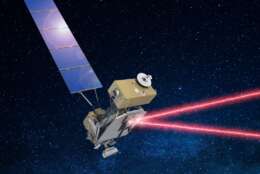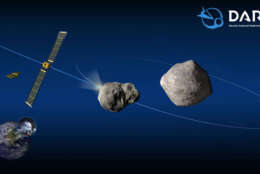Hubbard Radio Washington DC, LLC. All rights reserved. This website is not intended for users located within the European Economic Area.
On Air: Federal News Network
The Space Hour
-
Skull and Bones, Porcellian, Tri Delta. The exclusivity of these clubs have nothing on NASA's Astronaut Corps. With the agency looking to send Earth's best and brightest into space, you can imagine just what it takes to maintain that group.
January 31, 2022 -
With the retirement of the Space Shuttle program, the most popular one that NASA is best known for now is it's role in the International Space Station. It has a planned retirement of 2024. To get ready for that day, NASA has committed to replacing the ISS with one or more commercially owned and operated space destinations.
January 31, 2022 -
Recently, astronauts on the ISS had to take shelter after a Russian anti-satellite weapon test created a dangerous cloud of space debris. Naturally, the U.S .government is deeply concerned about the risk posed by space debris. This year's NDAA even includes a directive to identify efforts to advance alternatives to Hall thrusters. So what’s wrong with Hall thrusters? Well to find out, I spoke to Dr. Natalya Bailey, founder and chief strategy officer of Accion Systems.
January 03, 2022 -
There are some who think NASA needs a plan B. To find out what that could look like, I spoke to Don Nelson, who himself is a retired NASA engineer and currently the coordinator for the Concerned American Aerospace Engineers.
January 03, 2022 -
Prior to its Christmas Day launch, I had the chance to speak to Michael McElwain, who is the James Webb Space Telescope observatory scientist.
January 03, 2022 -
HySpecIQ claims it is now positioned to become the world’s leading provider of space-based hyperspectral imagery. To find out more, I spoke with the company's senior vice president of product and sales Tim Abbott.
December 06, 2021 -
Syracuse University Professor Henry Lambright recently penned a report, which draws on insights from recent and past NASA Administrators to chart how leaders have passed the torch toward enabling machine and human space exploration of Mars, and its long term impact on strategic priorities for the space program. I recently had the chance to speak with him about what he found.
December 06, 2021 -
I talked with Miriam Wennersten, NASA LCRD Ground Segment Manager.
December 06, 2021 -
To learn more about the Double Asteroid Redirection Test or DART, I spoke with Harrison Agrusa, who is a member of the DART Investigation Team and Dynamics Working Group.
December 06, 2021 -
The growth in the space industry hasn't been limited to the big companies everyone's heard of. Small businesses have also seen a growth in their bottom lines.
November 09, 2021 -
With more and more critical infrastructure relying on space technology, security of that tech becomes a major concern.
November 09, 2021 -
York Space builds satellites to their customers' likings and are in the process of expanding their headquarters in Denver, Colorado.
November 09, 2021 -
Have we reached a point where the government needs to play a bigger role in regulating who space companies work with?
September 28, 2021 -
The amount of wildfires and major weather disasters is only increasing stretching first responders and those trying to help very thin. A new program involving space technology though looks to help disaster response team get a better sense of just how much of an area has been effected.
September 28, 2021
















